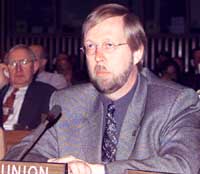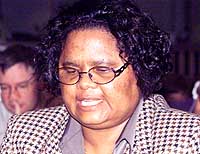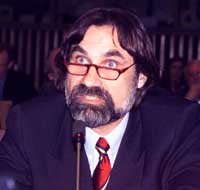 |
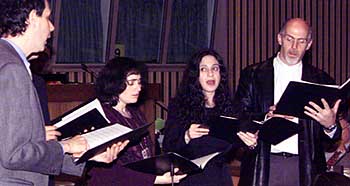 |
| Photo:
Singers at the Tribute Ceremony to UN West Timor Staff. |
Delegates
continued with the Multi-stakeholder Dialogue on Sustainable Energy
and Transport. The morning session focused on sustainable choices
for producing, distributing and consuming energy, and the afternoon
session focused on private-public partnerships to achieve sustainable
energy for transport.
|
|
ENB
Daily Reports
|
|
|
Mon 16
|
|
|
|
|
Tue 17
|
|
|
|
|
Wed 18
|
|
|
|
|
Thu 19
|
|
|
|
|
Fri 20
|
|
|
|
|
Mon 23
|
 |
|
|
|
Tue 24
|
 |
|
|
|
Wed 25
|
|
|
|
|
Thu 26
|
|
|
|
|
Fri 27
|
|
|
|
|
Mon 30
|
 |
|
|
|
Tue 01
|
|
|
|
|
Wed 02
|
|
|
|
 * To view PDF files, * To view PDF files,
you will need the free Adobe Acrobat Reader:
 * To listen to Real Audio
files, you will need the free Real Audio player: * To listen to Real Audio
files, you will need the free Real Audio player:
|
| Multi-Stakeholder
Dialogue Segment : Producing, Distributing and Consuming Energy. |
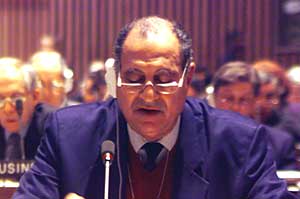 |

Business/Industry:
Emad
El-Sharkawi, World Business Council on Sustainable Development
(WBCSD), spoke for business and industry, outlined shortcomings
of various energy technologies and said that energy efficiency should
aim to reduce energy use through legislation and standards, labeling
programmes, building codes and information provision.
|

Science:
Richard
Ottinger, World Conservation Union (IUCN), speaking for the
scientific and technical community, underscored the need to set
appropriate prices by, inter alia: phasing out subsidies to polluting
and unsafe energy systems; incorporating externalities and life-cycle
costs; eliminating regulatory impediments; promoting hydrogen
fuel use; increasing research in carbon sequestration; supporting
R&D on natural gas; and accelerating research in renewable energy
technologies (RETs).
|
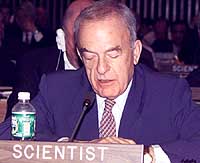 |
|
|

Trade
Unions:
Brian
Kohler, Communications, Energy and Paperworkers Union (Canada),
stated that the impasse on the Kyoto Protocol derives from the inability
to determine "when and how" to reduce the use of fossil fuels, and
stressed the centrality of trade unions in resolving the impasse
if the "Just Transition" policy is utilized, and called on the CSD
to support a joint research effort on employment.
|
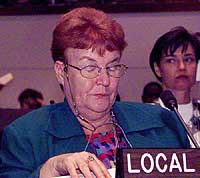
 Local Authorities:
Barbara
Cansdell, Council of Maroochy Shire (Australia), gave examples
of technologically and economically feasible efficient energy
uses and, on behalf of local authorities, called for national
standards for clean energy production and for priority investment
to reduce energy demand and achieve energy efficiency.
Local Authorities:
Barbara
Cansdell, Council of Maroochy Shire (Australia), gave examples
of technologically and economically feasible efficient energy
uses and, on behalf of local authorities, called for national
standards for clean energy production and for priority investment
to reduce energy demand and achieve energy efficiency.
|
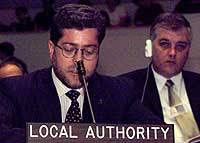
 Local Authorities:
Ross
Willmott, City of Leicester (United Kingdom), highlighted
local government activities on issues such as energy efficiency,
awareness raising, home energy surveys and energy advice centers.
He urged national governments to support initiatives such as demand
side management, energy codes, and purchasing policies.
Local Authorities:
Ross
Willmott, City of Leicester (United Kingdom), highlighted
local government activities on issues such as energy efficiency,
awareness raising, home energy surveys and energy advice centers.
He urged national governments to support initiatives such as demand
side management, energy codes, and purchasing policies.
|

NGOs:
Lipalesa
Sissie Matela, Environmental and Development Agency Trust,
on behalf of NGOs recommended, inter alia: phasing out nuclear
energy and fossil fuels in a reasonable time frame; increasing
focus on energy conservation and RETs; promoting sustainable energy
planning and construction; and disseminating information on minimum
efficiency standards.
|
|
Side Events:
|
Local
Energy and Transport Efficiency Strategies Reduce Greenhouse Gas
Emission
Organized
by the International Council for Local Environmental Initiatives
(ICLEI)
 |
 |
 |
 |
| photos
(left to right): Harvey Ruvin (USA), Jan Star (Australia), Ross
Willmott (UK), and Claudia Sheinbaum-Pardo (Mexico), present
best practices at the ICLEI side event. |
Clerk
of Court Harvey Ruvin, Miami-Dade County, Florida (USA) chaired the
side event on local strategies to mitigate GHG emissions. Shire President
Jan Star, Serpentine-Jarrahdale (Australia) presented her community's
efforts to improve energy efficiency. Ross Willmott, Councillor, City
of Leicester (UK) emphasized the need to engage designers, urban planners
and community participation in the planning and implementation of
strategies. Commissioner of the Environment, Claudia Cheinbaum-Pardo,
Mexico City (Mexico) outlined the effect of transportation trends
on energy consumption, and the need to strengthen municipal transportation
services. |
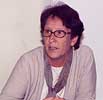 |
| Joke
Waller-Hunter, OECD. |
The OECD
Environmental Outlook to 2020
Joke Waller-Hunter,
Director, Environment Directorate, OECD, presented the OECD's environmental
outlook, environmentally sustainable transport and progress and
challenges OECD countries with regard to environmental information.
|
|
Tribute
Ceremony to UN West Timor Staff Killed in the Line of Duty &
to a Pioneer of Sustainable Development, Mr. Warren (Chip) Lindner
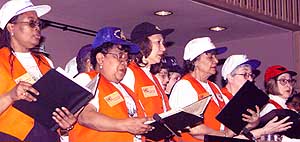
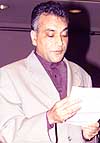
The
New York City Labour Chorus (above left) accompanies Naveed Hussein
(above right), UNHCR, in paying respects o individuals whose lives
were taken in the course of their dedicated work for humanity.
|
Multi-Stakeholder
Dialogue: Public-Private Partnerships to Achieve Sustainable Development
|

Business/Industry:
Arve
Thorviki, World Business Council on Sustainable Development
(WBCSD), described energy's relation to the three pillars of sustainable
development; highlighted the widespread use of petroleum for transport;
and said some fuel types are more appropriate for certain uses.
He said growing demand for energy and fuel for transport in the
developing world requires more sustainable and innovative transportation
markets.
|

|
|
|

Science:
Dr.
Nakicenovic, International Council for Scientific Unions, on
behalf of the scientific and technological communities, said that
global mobility has been rising since the end of the industrial
revolution, and that affordable and environmentally-sound mobility
is essential for sustainable development. He called for a zero-emission
transport system, increased support for research on sustainable
energy, and new transport infrastructure and technology.
|

Trade
Unions:
Stewart
Howard, The International Transport Workers Federation, speaking
for trade unions: expressed concern with the privatization of
rail networks and the negative aspects of the flags-of-convenience
system in the maritime industry; shared examples of poor working
conditions of transport workers; highlighted the close link between
transport safety, work and environmental conditions; and called
for international standards for safety, environment and labor.
|
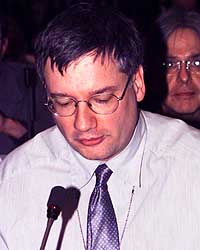
|
|
|






